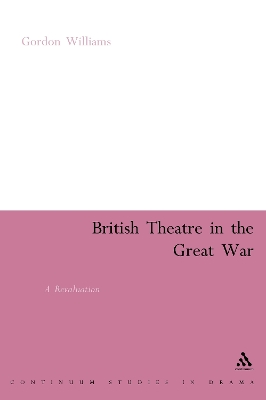Continuum Collection
1 total work
British Theatre in the Great War deals with a theatrical phase customarily dismissed by those charting twentieth-century developments. What becomes clear is that assessment by unsuitable literary criteria has masked the importance of the war years in British theatrical history. In avoiding a texts bias, the book reveals a period of unsurpassed prosperity in which the stage's substantial contribution to the war effort is only one notable feature. That it also saw the commercial theater's absorption of Continental avant-gardeism by way of revue, the last great epoch of music hall, the rise of the Old Vic with a project in opera and Shakespeare, and the unprecedented popularity of opera everywhere--this was surely the most fruitful period of Thomas Beecham's theatrical career--is compelling argument for revaluation. In his reassessment of this period, Dr. Williams extensively examines scripts and press coverage, providing a comprehensive overview from popular pantomime to the specialist work of the private stage as well as discussion of such issues as working conditions and censorship.
